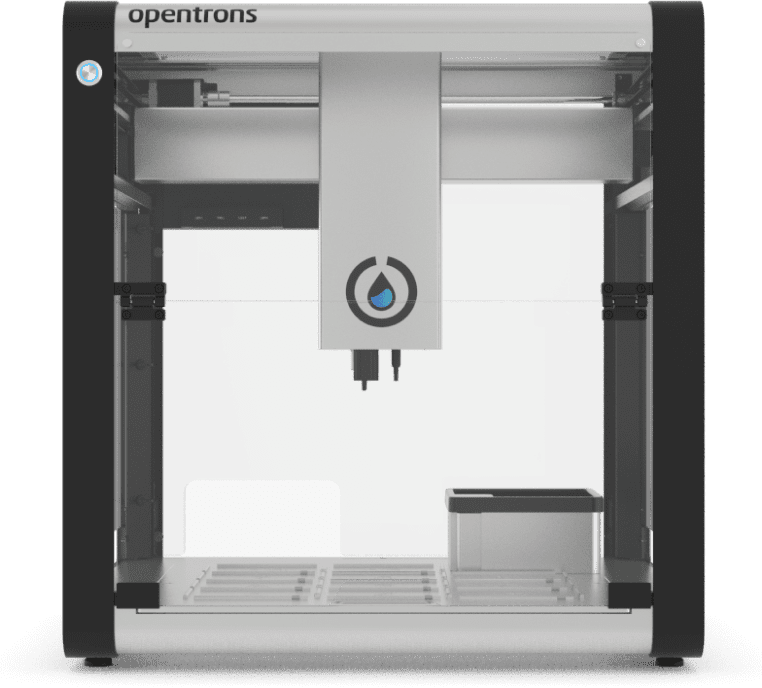
New York City — March 27, 2018 — Opentrons, the company making lab automation accessible, today announced the launch of its newest lab robot, OT-2, and new no-code Protocol Designer. The OT-2 release is supported by the close of a $10M seed funding round led by Khosla Ventures with participation from Lerer Hippeau Ventures, Y Combinator Continuity Fund, and Jeff Kindler, former CEO of Pfizer. This launch and financial backing furthers Opentrons’ mission to bring affordable automation to any biologist.
Biologists are poised to solve some of the world’s most significant problems, yet up to 90 percent of them still run experiments manually because cost and complexity prohibit their access to automation. Opentrons believes lab automation should be affordable, customizable, and easy to use. Starting with its lab robots that automate hundreds of applications with the speed and accuracy of tools 10 times the price, the company aims to free biologists from the tedious and error-prone process of manual pipetting to speed up scientific discovery and progress.
“Life sciences investment is surging because the potential for this industry to innovate everything from drug development to bio-manufacturing is exciting and inevitable. With access to automation, these developments can cost less and move faster,” said Vinod Khosla, Partner, Khosla Ventures. “Opentrons is not only bringing affordable equipment to labs of all sizes, but is harnessing the power of open source technology to cultivate a more collaborative scientific community. The lean biotech startup is possible now.”
Opentrons has doubled its customer base and employee headcount every six months since founding, and today hundreds of scientists and institutions use Opentrons, including 70 percent of the top 10 largest pharma companies and 90 percent of the top 50 biology research universities. Fundraising has supported the development of OT-2 robots, and will be used to maintain this pace of customer and company growth.
Small enough to fit on a bench and affordable for any size lab, Opentrons’ newest robot, OT-2, allows biologists to run an experiment with the click of a button. OT-2 includes access to a library of verified protocols developed by hundreds of scientists from across the scientific community. Building on the design and success of Opentrons’ first robot, OT-One, OT-2 requires less technical expertise to use. Biologists can start with pre-programmed protocols out of the box and adapt them to meet specific needs, or build their own protocols from scratch. Key OT-2 features include:
“We’ve learned so much from our customers about what the right automation solution is for the majority of biologists, and we built OT-2 to those specifications: affordable, easy-to-use, and reliable,” said Will Canine, Co-founder and Chief Product Officer at Opentrons. “Our mission is to democratize sophisticated biotech tools, and we are starting with lab robots. OT-2 is in a position to make a scientists’ day-to-day work easier, and ultimately speed up the process of scientific discovery.”
Scientists at institutions such as the Mayo Clinic, Stanford, Harvard, and MIT trust Opentrons robots. Drew Endy, Professor of Biological Engineering, Stanford said, “The OT-2 is a truly amazing laboratory automation platform. Opentrons is demonstrating that open and affordable hardware can also be the best in terms of performance and engineering. For us, the OT-2 means that anyone who can afford a laptop computer can also establish an open biofoundry. ”
Opentrons’ OT-2 robots start at $4,000 and are available for purchase here. See existing customers in action and request a demo today.
Opentrons is making automation accessible for any lab, starting with affordable pipetting robots for biologists. With its easy-to-use hardware and an open software platform, Opentrons automates manual lab work and empowers collaborative research for life scientists. Opentrons is used by scientists at 70 percent of top 10 largest pharma companies and 90 percent of top 50 biology research universities, and is backed by Khosla Ventures, Lerer Hippeau Ventures, and Y Combinator Continuity Fund.